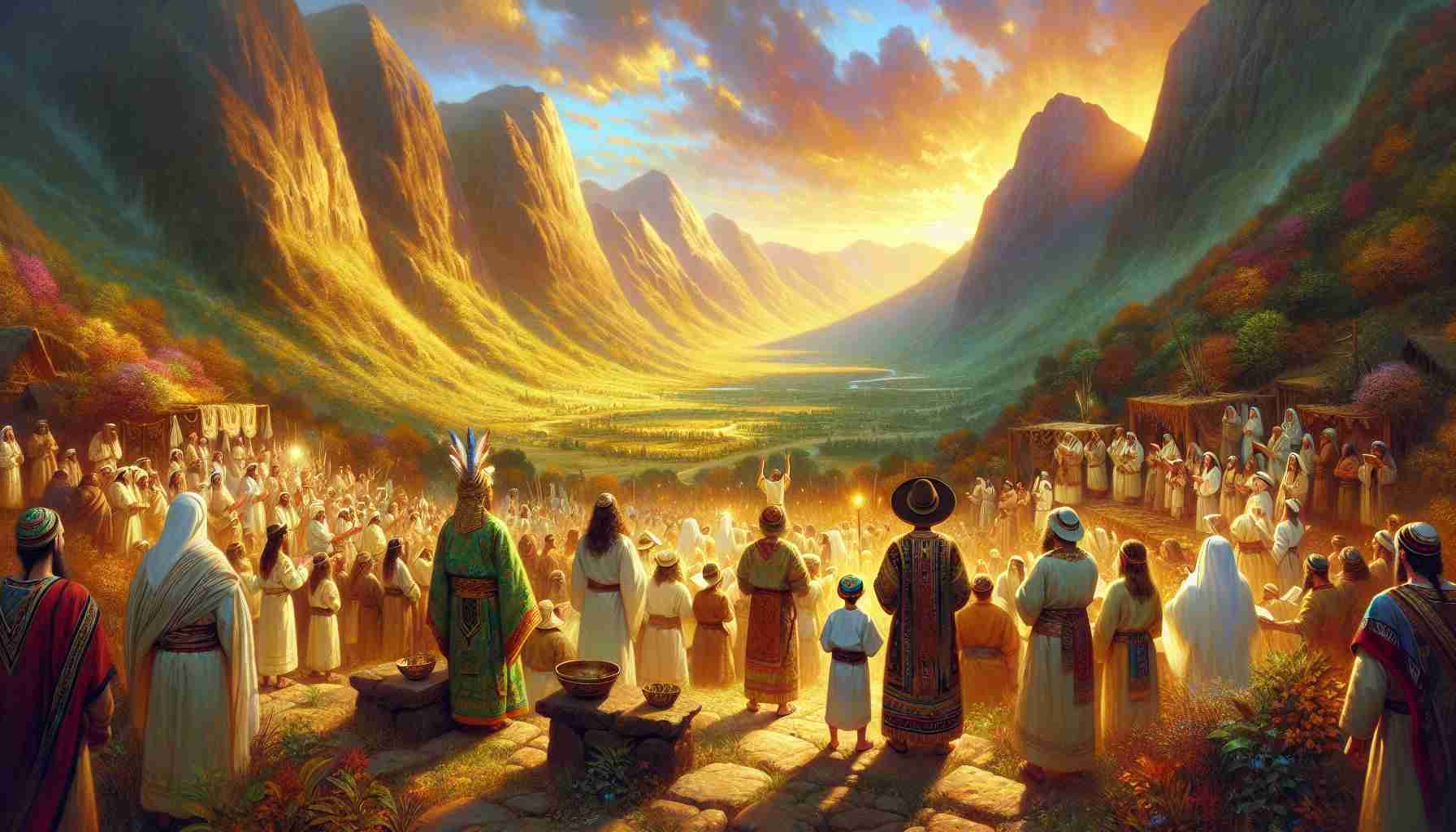

They called me Toviah the plasterer, though my hands hadn’t touched plaster in weeks. My real work had become hauling stones, baking bricks, and digging trenches beneath the blazing sun. We called it the “Land of Promise,” but it hadn’t come easy. Our mighty leader Moses had died before we crossed the Jordan River, and now Joshua—his student—stood in his place.
We had just finished placing the massive stones on Mount Ebal, as Moses had commanded us in the Torah, with the words of the covenant written clearly. But it was not Mount Ebal I kept watching—it was its twin, Mount Gerizim.
I remember the morning light spilling across the valley like warm oil, casting gold on Gerizim’s slopes. I had stood among thousands—men from every tribe. I was from Zebulun. We were one of the six tribes told to go up Mount Gerizim, the mount of blessing. The other six went to Mount Ebal, where the warnings of the covenant would be shouted.
It had been seven years since we first entered the land, and I was no longer a young man. But that day—standing with the Levites below, the Ark of the Covenant in their midst—it felt as though time had peeled back. I remembered Egypt. I remembered the sting of the whip on my back. I remembered the long desert wanderings, the funerals, the doubts, the fear.
And I remembered Moses’ voice, trembling and strong at once, telling us before he died: "When you cross into the land, stand on Mount Gerizim for blessings, and on Mount Ebal for curses." (Devarim 27)
Now we were here. I could see Mount Gerizim before me, lush and green, its spring-fed terraces curving against the sun. When the Levites began speaking, their voices echoed across the valley, clear and haunting.
“Blessed is the man who does not make an idol…”
“Blessed is the one who honors his father and mother…”
With each line, a thunder of “Amen” rose from us on Gerizim, like waves breaking on the shore of eternity.
It was not just words. My heart beat louder with each blessing.
To obey God would not be easy. But for the first time, I saw it clearly—this wasn’t just about survival. God wasn’t asking us to follow His commands only to avoid punishment. He was offering us joy. Wholeness. Life.
As the last “Amen” left my lips, something inside me shifted. I was not just a worker of stone or mud. I was a man of a covenant—a sacred bond that stretched back to Abraham, Isaac, and Jacob, and now flowed into the future through me.
When I came down from Gerizim that day, the valley looked the same—but I did not. Blessings had rung from that holy hill, and they echoed in my bones.
They called me Toviah the plasterer, though my hands hadn’t touched plaster in weeks. My real work had become hauling stones, baking bricks, and digging trenches beneath the blazing sun. We called it the “Land of Promise,” but it hadn’t come easy. Our mighty leader Moses had died before we crossed the Jordan River, and now Joshua—his student—stood in his place.
We had just finished placing the massive stones on Mount Ebal, as Moses had commanded us in the Torah, with the words of the covenant written clearly. But it was not Mount Ebal I kept watching—it was its twin, Mount Gerizim.
I remember the morning light spilling across the valley like warm oil, casting gold on Gerizim’s slopes. I had stood among thousands—men from every tribe. I was from Zebulun. We were one of the six tribes told to go up Mount Gerizim, the mount of blessing. The other six went to Mount Ebal, where the warnings of the covenant would be shouted.
It had been seven years since we first entered the land, and I was no longer a young man. But that day—standing with the Levites below, the Ark of the Covenant in their midst—it felt as though time had peeled back. I remembered Egypt. I remembered the sting of the whip on my back. I remembered the long desert wanderings, the funerals, the doubts, the fear.
And I remembered Moses’ voice, trembling and strong at once, telling us before he died: "When you cross into the land, stand on Mount Gerizim for blessings, and on Mount Ebal for curses." (Devarim 27)
Now we were here. I could see Mount Gerizim before me, lush and green, its spring-fed terraces curving against the sun. When the Levites began speaking, their voices echoed across the valley, clear and haunting.
“Blessed is the man who does not make an idol…”
“Blessed is the one who honors his father and mother…”
With each line, a thunder of “Amen” rose from us on Gerizim, like waves breaking on the shore of eternity.
It was not just words. My heart beat louder with each blessing.
To obey God would not be easy. But for the first time, I saw it clearly—this wasn’t just about survival. God wasn’t asking us to follow His commands only to avoid punishment. He was offering us joy. Wholeness. Life.
As the last “Amen” left my lips, something inside me shifted. I was not just a worker of stone or mud. I was a man of a covenant—a sacred bond that stretched back to Abraham, Isaac, and Jacob, and now flowed into the future through me.
When I came down from Gerizim that day, the valley looked the same—but I did not. Blessings had rung from that holy hill, and they echoed in my bones.